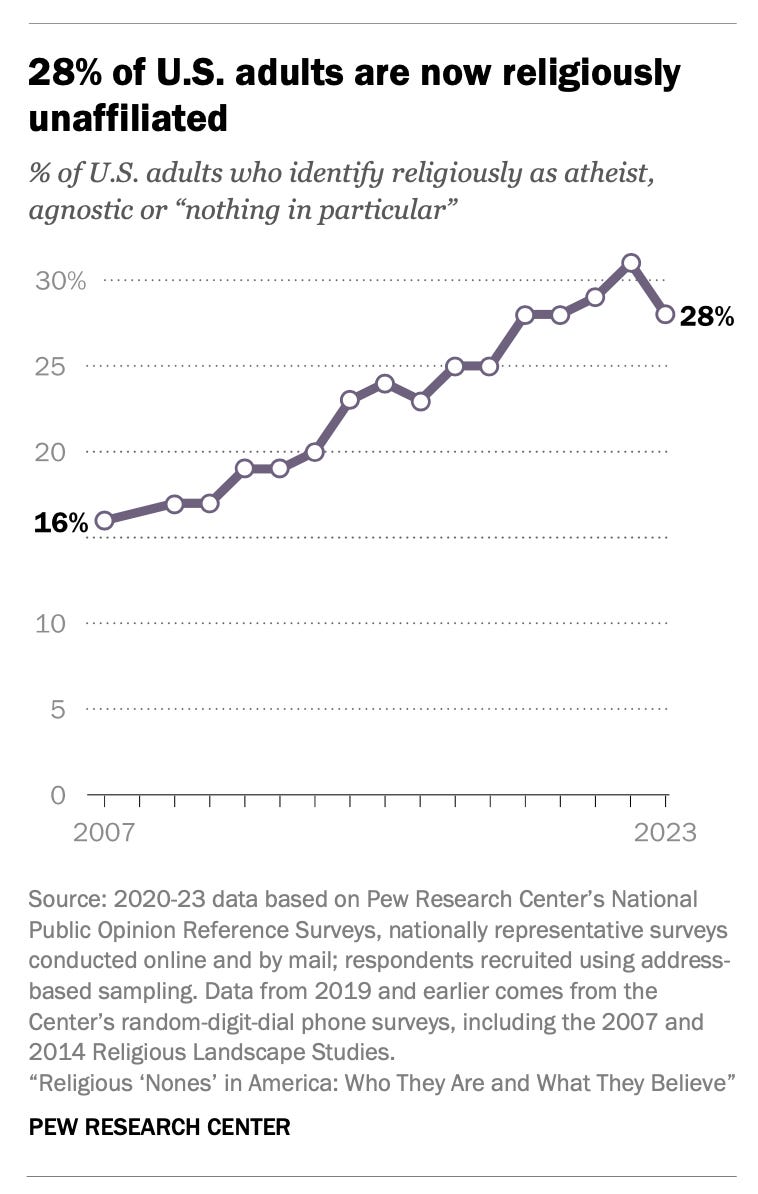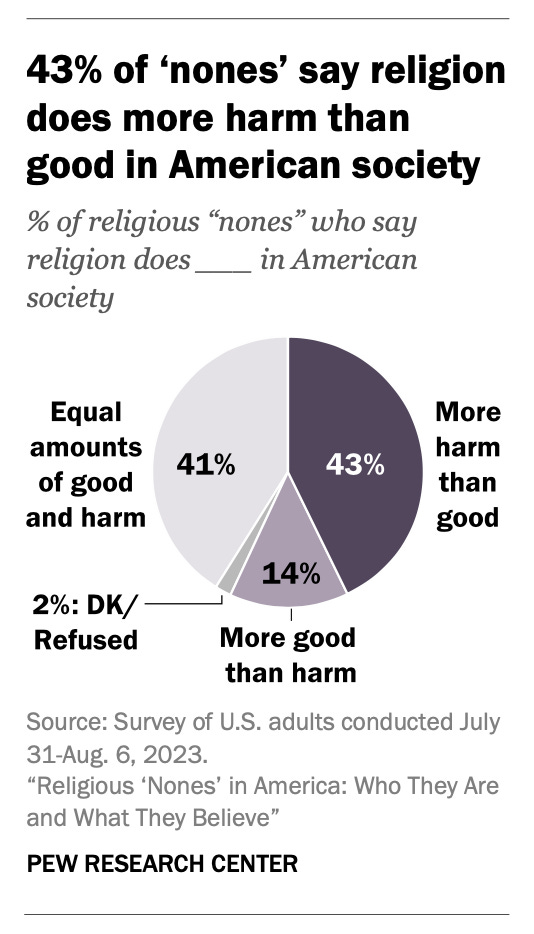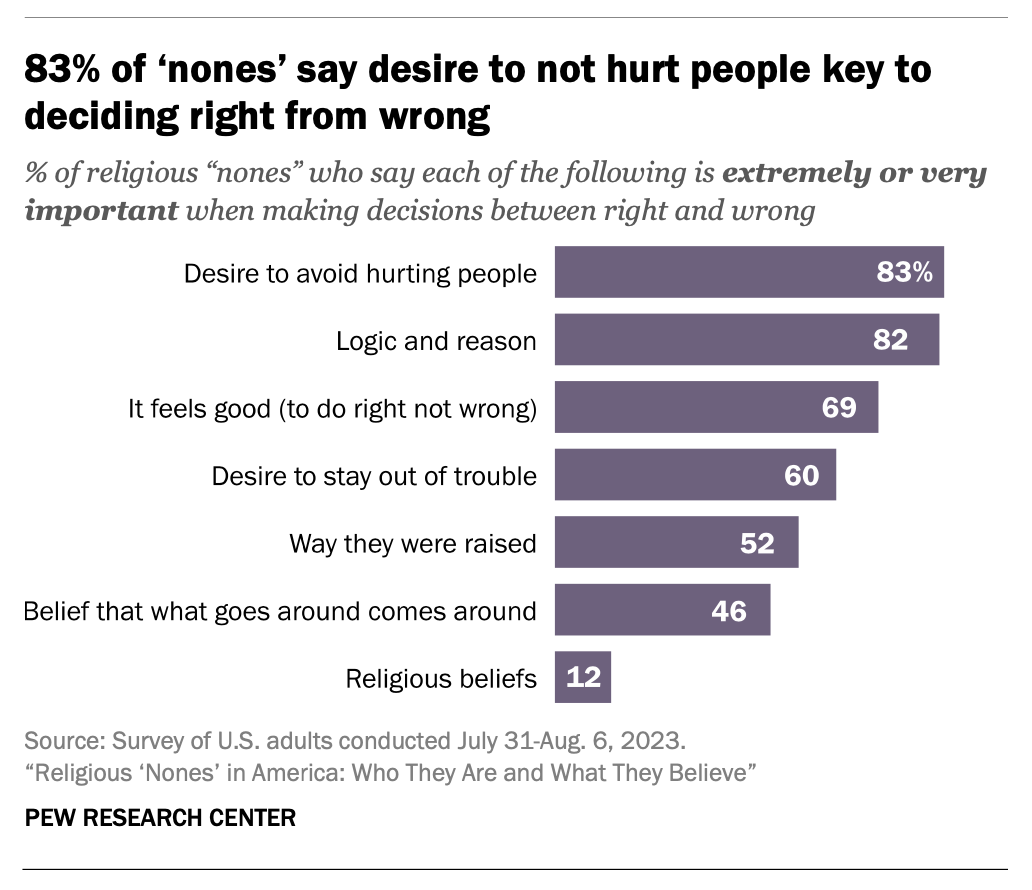Has the "Rise of the Nones" finally plateaued?
The Pew Research Center offers an in-depth analysis of the people who reject organized religion
This newsletter is free, but it’s only able to sustain itself due to the support I receive from a small percentage of regular readers. Would you please consider becoming one of those supporters? You can use the button below to subscribe to Substack or use my usual Patreon page!
For the past couple of decades, it seemed like every survey showed a rise in the number of Americans who were abandoning organized religion. The growth of atheists and agnostics, specifically, was minimal, but the “Nones”—the people who say their religious affiliation is nothing in particular even if they believe in some “higher power”—kept going up.

Until now.
A new paper released today by the Pew Research Center offers some of the most detailed analysis we’ve ever seen of the Nones, based on data collected last summer. While it’s too early to know if the “rise” is going to level off, it sure seems like that’s the direction in which we’re heading.
Here are the big takeaways:
The Nones may have peaked
28% of Americans have no religious affiliation, but that’s slightly down from 31% just a year earlier.
It’s possible this is just a one-time blip. Still, this is the sharpest one-year decline we’ve seen in nearly two decades. How many more people are there to get? At some point, you have to believe we’ve found just about all the people who are fed up with organized religion. (Respondents who said their religion was “something else” outside of the typical labels were not included in the Nones number.)
The upside is that it’s not like there’s any major religious denomination taking them in. Most Christian groups are either steady or shrinking. And it’s not like they’re doing anything to draw in new people. When the survey asked people to explain the reasons they’re non-religious, 55% cited their frustration with religious organizations and people (as opposed to just not believing in God anymore). With many powerful religious groups (Southern Baptists, Catholics, white evangelicals) promoting right-wing politics, anti-LGBTQ bigotry, cruel anti-abortion measures, etc., there’s no reason to think they’re winning the hearts and minds of people on the fence.
The Nones aren’t as politically active as the religious
When it comes to various measures of civic engagement, the Nones just don’t match the firepower of the religious. They volunteer less, they don’t vote as much, and they don’t reach out to elected officials or attend government meetings.
Some of that is to be expected. If you don’t have strong feelings about religion, it’s hard to think you’ll have strong beliefs about anything connected to it, including politics. Indeed, the civic engagement numbers for Nones are on par with religious people who rarely or never attend church.
… “nones” are about as likely as religiously affiliated people who don’t attend religious services to say they volunteered in the past year or that they are involved in a nonreligious community service group.
“Nones” are also about as likely as religiously affiliated people who don’t attend religious services to express satisfaction with their social lives and to have felt hopeful lately.
On the other hand, opinionated people are more likely to take a side—that’s true for people who openly reject belief in God and people who attend church regularly. Atheists vote at similar rates to the religious and we also have the same life satisfaction. (We volunteer less and admit to more loneliness, though I would argue that’s much more due to the social infrastructure that religions provide and nothing inherent about the beliefs themselves.)
The biggest concern there may be the voting numbers. As I’ve argued before, there’s no reason to take a victory lap over the shifting religious landscape if Secular Americans don’t vote in their best interests. These numbers show that only 32% of the Nones voted in the 2022 midterms—a pathetic turnout—compared to 51% of religious Americans. If that doesn’t change in 2024, and the Nones stay at home instead of voting against the Christian Nationalism of the Republican Party, it would be a disaster for the country.
The Nones could be atheists in the making
It’s possible a good chunk of those wishy-washy Nones will just realize they’re atheists. As it stands, about 17% of the Nones are atheists, 20% are agnostics, and the rest (63%) say they’re “nothing in particular.”
But when you ask the Nones what they think about religion, it’s not like they’re split down the middle.
43% of the Nones say religion does more harm than good while a nearly equal number say it’s a wash. Only 14% believe religion is a force for good.
Similarly, 56% of Nones say science does more good than harm, while only 5% take the more conspiratorial stance that science is somehow bad.
That suggests that even if the percentage of Nones drops, those people will enter the ranks of atheists and agnostics rather than the sort of larger religious groups that stand in opposition to reality.
The morality of the Nones makes sense
The biggest question regarding the Nones may be their morality. Do they have it? If so, where does it stem from?
Atheists tend to have answers to those questions because it’s one of the first things we have to consider when rejecting God-belief. But when the Nones were asked what matters to them when it comes to deciding between right and wrong, just look at their answers:
More than four out of five Nones cited the desire not to hurt people (The Golden Rule!) and roughly the same number talked about logic and reason. Only 12% of non-religious people cited religious beliefs (perhaps ones they had when they were younger) as the big factor.
All of that is to say that there are sensible, rational ways people can come to moral conclusions. God doesn’t have to be involved in any of it. Even if you’re not explicitly non-religious, secular morality is becoming much more of a norm in society.
The Nones look more like America than atheists
When you look at the demographics of atheists and compare them to the Nones as a whole, atheists tend to be more male (64% vs. 51%), more white (77% vs. 63%), more young (71% under age 50 vs. 69%) more formally educated (with a college degree) (48% vs. 35%), more liberal (65% vs. 42%), and more Democratic (78% vs. 62%).
But when you compare Nones to all Americans, there’s much more parity in certain areas. There’s a closer gender balance. The racial makeup is virtually identical, as are the formal education numbers. Nones, however, are more liberal (42%) than the country overall (25%).






I suppose I shouldn't be surprised at the possibility of a plateau in the growth of the non-religious. Expecting a continuous increase in the numbers of those who, at some level or other, recognize that religions and the beliefs they promote are problematic is almost certainly unrealistic.
Still, one datum isn't the whole curve. I would like to see at least two or three more points plotted before making any kind of broad assumption. Let's see what the dx/dt (for those of you who studied calculus) REALLY is before jumping to conclusions.
It's all too nebulous to draw any firm conclusions. My opinion is most people are non religious. In the immortal words of ee cummings, the best thing about modern life is not going to church on Sunday.